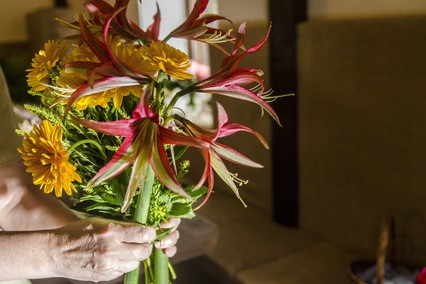Description
Florists, also called floral designers, cut and arrange live, dried, and silk flowers and greenery to make decorative displays. They also help customers select flowers, containers, ribbons, and other accessories.
Tasks:
1. Confer with clients regarding price and type of arrangement desired and the date, time, and place of delivery.
2. Plan arrangement according to client's requirements, utilizing knowledge of design and properties of materials, or select appropriate standard design pattern.
3. Water plants, and cut, condition, and clean flowers and foliage for storage.
4. Select flora and foliage for arrangements, working with numerous combinations to synthesize and develop new creations.
5. Order and purchase flowers and supplies from wholesalers and growers.
6. Wrap and price completed arrangements.
7. Trim material and arrange bouquets, wreaths, terrariums, and other items using trimmers, shapers, wire, pins, floral tape, foam, and other materials.
8. Perform office and retail service duties such as keeping financial records, serving customers, answering telephones, selling giftware items and receiving payment.
9. Inform customers about the care, maintenance, and handling of various flowers and foliage, indoor plants, and other items.
10. Decorate or supervise the decoration of buildings, halls, churches, or other facilities for parties, weddings and other occasions.
11. Grow flowers for use in arrangements or for sale in shop.
Key skills for Florist:
United Kingdom: experienced florists can earn between £16,000 and £25,000 a year.
United States of America: $23,810 per year
Australia: AU$19.42 per hour
Qualifications and training required:
Most florists have a high school diploma or the equivalent. There are postsecondary programs that are useful for florists who want to start their own businesses. Programs in design and caring techniques for flowers are available through private floral schools, vocational schools, and community colleges. Most offer a certificate or diploma. Classes in flower and plant identification, floral design concepts, advertising and other business courses, plus experience working in a greenhouse are part of many certificate and diploma programs.
Some community colleges and universities offer an associate’s or bachelor’s degree in floral design.
New florists typically get hands-on experience working with an experienced floral designer. They may start by preparing simple flower arrangements and practicing the basics of tying bows and ribbons, cutting stems to appropriate lengths, and learning about the proper handling and care of flowers. They also learn about the different types of flowers, their growing properties, and how to use them in more complex floral designs.
Tasks:
1. Confer with clients regarding price and type of arrangement desired and the date, time, and place of delivery.
2. Plan arrangement according to client's requirements, utilizing knowledge of design and properties of materials, or select appropriate standard design pattern.
3. Water plants, and cut, condition, and clean flowers and foliage for storage.
4. Select flora and foliage for arrangements, working with numerous combinations to synthesize and develop new creations.
5. Order and purchase flowers and supplies from wholesalers and growers.
6. Wrap and price completed arrangements.
7. Trim material and arrange bouquets, wreaths, terrariums, and other items using trimmers, shapers, wire, pins, floral tape, foam, and other materials.
8. Perform office and retail service duties such as keeping financial records, serving customers, answering telephones, selling giftware items and receiving payment.
9. Inform customers about the care, maintenance, and handling of various flowers and foliage, indoor plants, and other items.
10. Decorate or supervise the decoration of buildings, halls, churches, or other facilities for parties, weddings and other occasions.
11. Grow flowers for use in arrangements or for sale in shop.
Key skills for Florist:
- Creativity and artistic flair
- An understanding of the properties and needs of different plants and flowers
- The ability to explain your ideas to customers
- Good practical skills
- A helpful, pleasant and tactful manner
- The ability to work out costs and manage money
- The ability to work under pressure
United Kingdom: experienced florists can earn between £16,000 and £25,000 a year.
United States of America: $23,810 per year
Australia: AU$19.42 per hour
Qualifications and training required:
Most florists have a high school diploma or the equivalent. There are postsecondary programs that are useful for florists who want to start their own businesses. Programs in design and caring techniques for flowers are available through private floral schools, vocational schools, and community colleges. Most offer a certificate or diploma. Classes in flower and plant identification, floral design concepts, advertising and other business courses, plus experience working in a greenhouse are part of many certificate and diploma programs.
Some community colleges and universities offer an associate’s or bachelor’s degree in floral design.
New florists typically get hands-on experience working with an experienced floral designer. They may start by preparing simple flower arrangements and practicing the basics of tying bows and ribbons, cutting stems to appropriate lengths, and learning about the proper handling and care of flowers. They also learn about the different types of flowers, their growing properties, and how to use them in more complex floral designs.
Companies in profession
Best students in profession
Professions you might be interested in
Virtual internship
Company recommended study programs
SIA KKK
1 recommendations
FLORISTIKAS SPECIĀLISTS
Bulduru Dārzkopības vidusskola
- 4 company recommendations
Latvijas Roze
1 recommendations
FLORISTIKAS SPECIĀLISTS
Bulduru Dārzkopības vidusskola
- 4 company recommendations
EL-FLORA
1 recommendations
FLORISTIKAS SPECIĀLISTS
Bulduru Dārzkopības vidusskola
- 4 company recommendations
NIP
1 recommendations
FLORISTIKAS SPECIĀLISTS
Bulduru Dārzkopības vidusskola
- 4 company recommendations
In our portal we are using cookies. Using the portal, you agree to the use of cookies. You can find out more!
Accept


